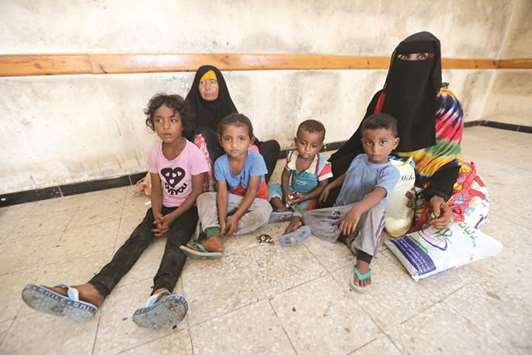Martin Griffiths was believed to be pushing a deal for rebel leaders to cede control of the Red Sea port to a UN-supervised committee and halt heavy clashes against advancing government troops backed by Saudi Arabia and the United Arab Emirates.
The envoy did not make any statement on his arrival at Sanaa international airport on Saturday.
More than 70% of Yemeni imports pass through Hodeida’s docks and the fighting has raised UN fears of humanitarian catastrophe in a country already teetering on the brink of famine. Yemen’s government and its allies launched their offensive on Wednesday, since when at least 139 combatants have been killed, according to medical and military sources.
The Houthi rebels have controlled the Hodeida region with its population of some 600,000 people since 2014.
Earlier this year, the Saudi-led coalition imposed a near-total blockade on the city’s port alleging it was being used as a conduit for arms smuggling to the rebels. The capture of Hodeida would be the coalition’s biggest victory of the war so far, and rebel leader Abdel Malek al-Houthi on Thursday called on his forces to put up fierce resistance and turn the region into a quagmire for coalition troops.
The Yemeni army on Saturday claimed it had seized control of the rebel base at Hodeida’s disused airport, which has been closed since 2014. An AFP correspondent on the front line could not confirm the report and a spokesman for the coalition, which has troops taking part in the offensive, did not respond to repeated requests for comment.
But military sources later denied that the army had entered the airport. They told AFP, however, that sporadic clashes were underway at the airport’s southern gate. The highway between Hodeida and the government-held port of Mokha was also the scene of fighting, they said, adding that loyalist forces had suffered “losses”.
The United Nations and relief organisations have warned that any all-out assault on Hodeida would put hundreds of thousands of people at risk. The fighting is already nearing densely populated residential areas, the Norwegian Refugee Council warned, and aid distributions have been suspended in the west of the city.
The International Committee of the Red Cross said thousands were likely to flee if the fighting continued. The World Health Organisation called on all sides “to protect health workers and their facilities from harm, as well as to ensure unimpeded access for medical teams seeking to treat the wounded”. On Thursday, the UN Security Council demanded that Hodeida port be kept open to vital food shipments but stopped short of backing a Swedish call for a pause in the offensive to allow for talks on a rebel withdrawal.
The Yemen war has claimed some 10,000 lives since the coalition intervened in 2015 when President Abedrabbo Mansour Hadi fled into exile to Saudi Arabia when the rebels overran much of the country.
More than 22mn Yemenis are in need of aid, including 8.4mn who are at risk of starvation, according to the UN, which has described the conflict as the world’s worst humanitarian crisis.



